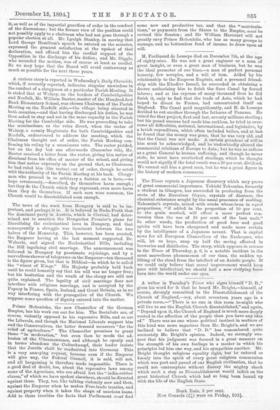A curious story is reported in Wednesday's Daily Chronicle, 'which,
if correctly reported, indicates singular nnwiadom in the conduct of a clergyman at a particular Parish Meeting. It is stated that at Welney, on the borders of Cambridgeshire and Norfolk, Mr. William Baxter, master of the Hundred-feet Bank Elementary School, was chosen Chairman of the Parish Meeting on the Norfolk side,—the village being situated in both counties,—and that having discharged his duties, he was then asked to stay and act in the same capacity in the Parish Meeting for the Cambridge side. He was proceeding to take the nominations, as the rules direct, when the rector of Welney, a county Magistrate for both Cambridgeshire and Norfolk, endeavoured to address the meeting, which the Chairman thought out of order, the Parish Meeting con- firming his ruling by a unanimous vote. The rector yielded, but on the day but one afterwards (December 0th), Mr. Baxter received a letter from the rector, giving him notice of dismissal from his office of master of the school, and giving him that notice expressly on the ground that, as Chairman, he had ruled him (the rector) out of order, though he acted with the authority of the Parish Meeting at his back. Clergy- men who proceed in so arbitrary a fashion as is here,—we hope erroneously,—described, do themselves harm enough ; but they do the Church which they represent, even more harm than they do themselves. If such men were common, the Church would be disestablished soon enough.








































 Previous page
Previous page